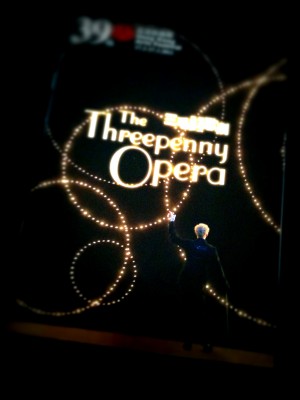Threepenny Opera
If I wanted to sell you on a night at the theatre, then I wouldn’t start by saying it is an Opera, in German and it goes for over three hours. I’d probably also omit to say that it comes from Bertolt Brecht, a name that for many theatre goers brings back memories of pretentiously […]
If I wanted to sell you on a night at the theatre, then I wouldn’t start by saying it is an Opera, in German and it goes for over three hours. I’d probably also omit to say that it comes from Bertolt Brecht, a name that for many theatre goers brings back memories of pretentiously difficult university productions.
But, Thursday night’s performance of The Threepenny Opera by the Berliner Ensemble was brilliant precisely because of those elements. It is an Opera, but it was also operatic in the sense of being extravagantly and knowingly theatrical. As dramatic as the performance was, you were always made to feel as though you were watching a play, from the opening parade of characters through to the framing of the closing scene with a classic red curtain. Moreover, the staging felt true to The Threepenny Opera’s German modernist roots and Brecht’s own ideas for the way emotion, psychology and comedy ought to be portrayed.
Although I’m familiar with The Threepenny Opera, I was blown away by this interpretation and everything about it won me over. I first studied The Threepenny Opera in High School, after reading a review that noted the similarities between Tom Waits’ style and Brecht’s work with Kurt Weill. Despite that awareness I walked away from the theatre on Thursday night with a head full of ideas and questions about the text and music of this work.
This acclaimed production (see this excellent review, Robert Wilson does The Threepenny Opera, for more detail) does an amazing job of making us think about our current moment in history whilst also evoking the dreadful fate that awaited Brecht’s own country and culture. The high-Marxist critiques of Capitalism are served up without a hint of irony, which makes them all the more poignant and tragic.
Although the look is very contemporary, with remarkable costumes, make-up, lighting, and sound effects, it also feels “authentic” with the original score performed by a live orchestra and all the effects used to create the kind of tension and disjunction Brecht was known for.
The staging is inherently sexy and visually informed but that is not overplayed and doesn’t succumb to out current modes of fashion. In fact, the whole performance lacks the kind of safe, whitewashed retro-fetishism than undermines a lot of contemporary productions. Peachum is portrayed as a money-hungry urban Jew, which is an uncomfortable cliche for us, but speaks to the social tensions at work in 20s and 30s Germany.
But, The Threepenny Opera isn’t just a history lesson. Nervous laughter was heard at the points in the play where bankers are indicted for their pernicious effects upon the economy. Moreover, with regular news stories about the dark-side of the Chinese economic miracle, in terms of horrendous factory working conditions, the lyrics of “What Keeps Mankind Alive” felt as poignant as ever,
“What keeps mankind alive?
The fact that millions are daily tortured, stifled, punished, silenced and oppressed
Mankind can keep alive thanks to its brilliance in keeping its humanity repressed
And for once you must try not to shirk the facts
Mankind is kept alive by bestial acts!”
Watching this interpretation reminds one that Brecht’s work is still a touchstone for edgy popular art, from filmmakers like Lars von Trier to songwriters like Tom Waits. It’s no surprise to hear that Nick Cave and Andy Serkis have plans to do a new film adaptation.
This was a bold, forthright and remarkable staging of The Threepenny Opera. The intensity and illusion never waned. It was a shame to see empty seats at the start of the performance and a lot people leaving at the interval. But, that was counterbalanced by the large number of young adults in attendance and the rapturous and appreciative applause that the performers received at the end of the night. The Berliner Ensemble deserve all the accolades they have received for this adaptation and the Hong Kong Arts Festival are to be applauded for bringing this kind of work to Hong Kong.





